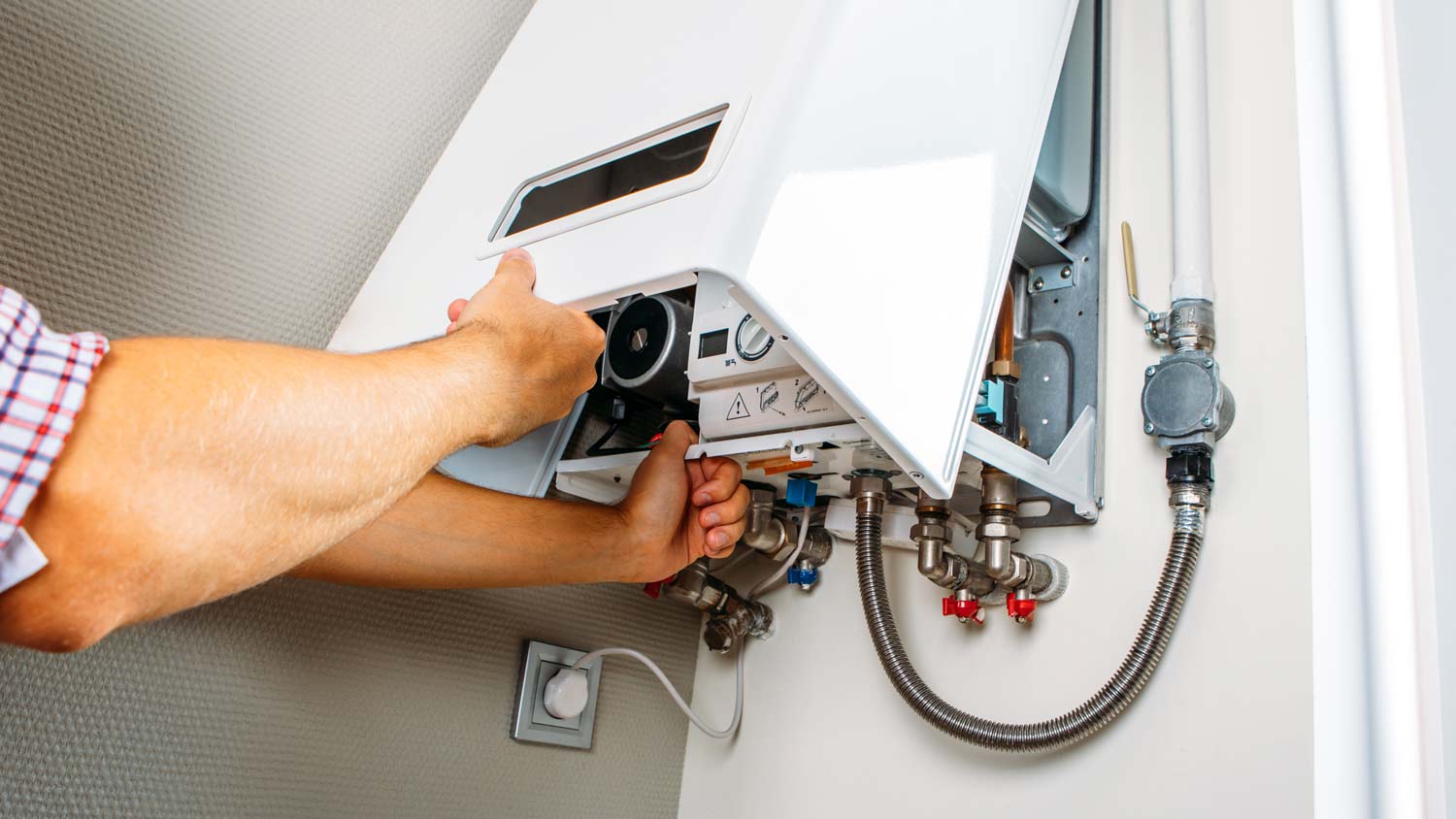
Gas furnace replacement costs depend on the type of furnace you want and installation fees. Our guide explains all the factors involved in a new furnace cost.
Don’t get caught in cold showers


Your boiler provides hot water to your home—without that your showers won’t be so cozy and your dishes won’t be as clean. That’s why it’s important to schedule a regular annual inspection with a local professional to make sure you don’t get caught in those chilly situations. The average cost for a boiler inspection is $415.
Before your inspector checks in, you can learn what they’ll look at when it comes to your boiler and keep up with routine maintenance to keep it operating smoothly and your water running hot between checkups.

It’s important to have your boiler inspected by a local boiler technician once a year to ensure that everything is working properly. They’ll be able to identify any harmful issues such as leaking carbon monoxide and fix them before they cause concern.
During the inspection, the technician will follow a checklist that includes:
Looking for leaks and corrosion
Making sure all thermostats are turned up
Testing the pressure relief
Confirming the pump, zone valve, and damper operation
Checking the flame signal, gas pressure, combustion motor, and pressure switch
Cleaning the cabinet and removing sludge from the blowdown
Confirming the pressure and temperature reading
Cleaning the pilot assembly, orifice, and sensor
Inspecting and cleaning the burners
Confirming the flow of each zone
If the technician discovers any issues that need to be fixed, they’ll provide you with a report and quote for the repair cost.
However, there are some key indicators that signal your boiler is beyond repair and needs to be replaced. These include:
Frequent boiler services and repairs
Unit failure and shut-offs
Black soot around the gas burners
Yellowing on the gas burners
Frequent need for repairs
Failure to maintain indoor temperatures
Longer heating time
Leaks in your unit that require you to add more water to your boiler
Energy bill increases
If you run into any of these issues, you can expect to pay between $1,800 to $16,000 for a boiler replacement, depending on the type of unit you have.
Along with an annual professional inspection, it’s important to conduct regular maintenance yourself to ensure your boiler stays in top condition. The average home boiler should last around 20 years. Use this checklist regularly to keep your boiler running smoothly for all those years:
Look for common warning signs: Keep an eye out for common warning signs that may mean your boiler is not working correctly. These include a leaking pipe, the pilot light going out, whistling or banging noises, or the boiler turning itself off. If you discover any of these issues, call a local boiler technician to come take a look at it.
Stay vigilant for gas smells: Always be on the lookout for any sign of carbon monoxide leaks. If you smell gas, get lightheaded, or feel confused without reason, immediately call emergency services.
Make sure your boiler has proper ventilation: Check the area around your boiler once a week to ensure that your belongings aren’t crowding the boiler. It should have at least a 27-inch space from the wall and nothing hung on top of it.
Adjust the pressure gauge: To keep hot water circulating throughout your home, you need to have adequate water pressure. Check the pressure gauge once a week on your boiler and adjust it if it’s too high or low. The recommended pressure is between one and two bars.
Check the insulation: If your boiler is not properly insulated, it will lower its efficiency and allow heat to escape. Look for any holes or weak spots in the insulation monthly and repair them if necessary.
Test the boiler: If your boiler is shut off for a period of more than one month, turn it on for a couple of minutes to make sure everything is working properly.
“Bleed” the radiators: Air pockets can get trapped in your radiators over time, and need to be released as they can form cold patches that lower the heat your boiler releases. Once a quarter, slightly open the valves until the air is released. It’s important to tighten them up after to prevent water from shooting out.
Lag your pipes: During the colder months, wrap lagging material around your pipes. This can be purchased from your local hardware store and will help to prevent freezing or bursting pipes.
From average costs to expert advice, get all the answers you need to get your job done.

Gas furnace replacement costs depend on the type of furnace you want and installation fees. Our guide explains all the factors involved in a new furnace cost.

Whole-house humidifier costs vary based on the type and size of the unit, along with other factors. The price might be worth it for people living in dry regions.

What you’ll pay for furnace repairs depends on many factors, including what parts are malfunctioning, where you live, and even the time of day. Here’s a breakdown of what can go wrong with your furnace and the cost to fix those issues.

Your return air vent is responsible for removing warmer air, so testing it ensures you keep your environment comfortable and there are no HVAC problems.

If you’re having issues with your heating and cooling system, it’s probably time to discuss these heat pump questions with your HVAC pro.

An icy coil can create costly AC repairs. Learn what to do if the evaporator coil freezes to ensure your HVAC system operates efficiently.